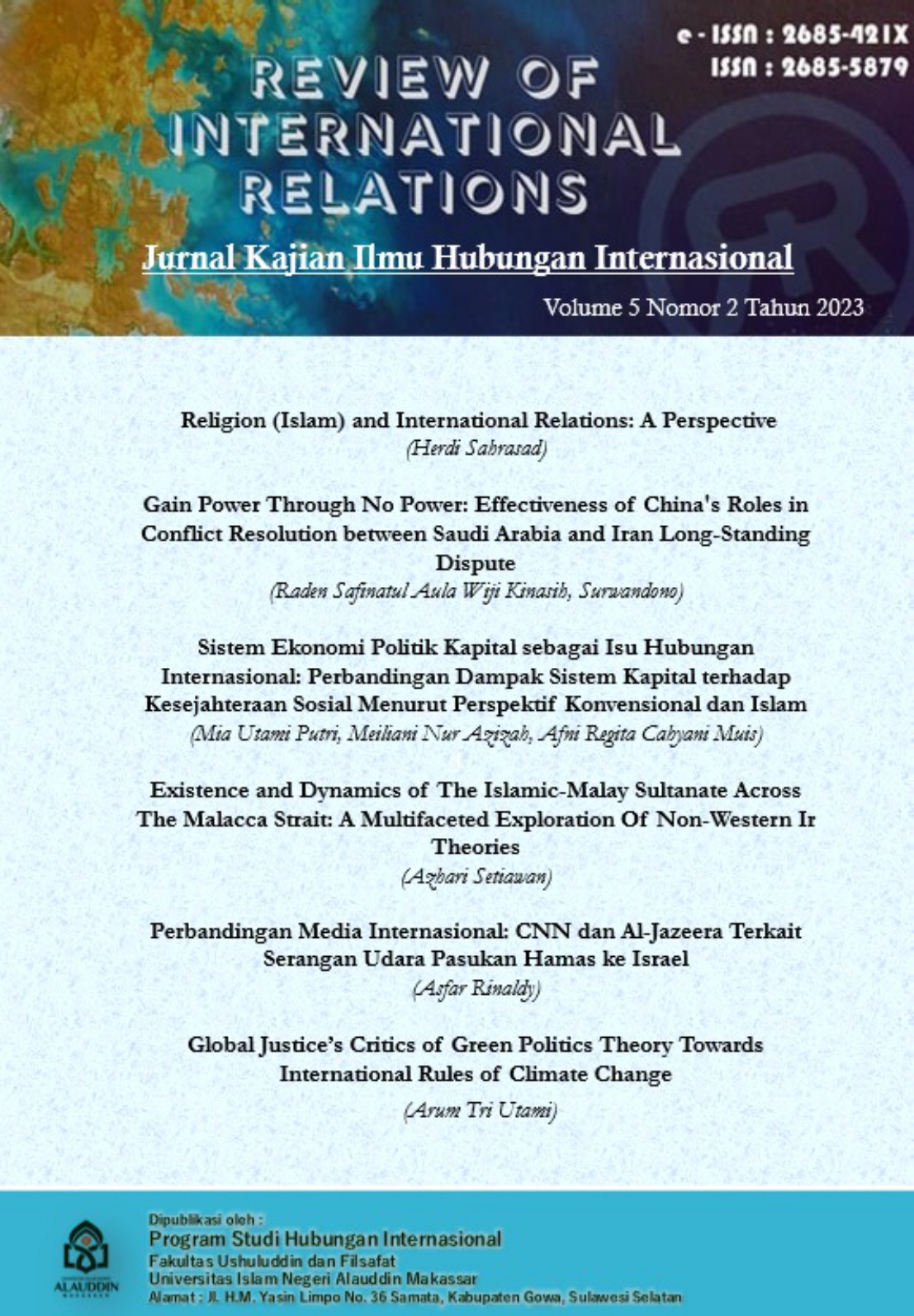Religion (Islam) and International Relations: A Perspective
Abstract
This article argues that religion (Islam) and international relations in the era of post-war globalization, have its own relevance and contextuality. So far, the international relations in the post-Cold War was marked by the rise of actors and issues. In the realm of actors, emerging non-state actors who perform various international relations practices both leading to cooperation and peace as well as toward conflict and conflict. The state is no longer a dominant actor although it remains the primary actor. In the realm of the issue, the concern of mankind is no longer focused on high politics in the form of matters of national security and military alone, but the issues that were originally included in the category of low politics were even more prominent. As an impact, disruption to international security and order is not a monopoly of the issue of national security. Non-traditional security threats such as environmental issues, the spread of disease, transnational crime and others, also threaten global peace. Conflicts of communal identity that are usually based on religion, ethnicity, race, clan, tribe, or other identity become one of the leading ones. And in such international situation, Islam is challenged to respond the complexities of today's international problems.
Downloads
References
Azyumardi Azra, Wayne Hudson, Islam Beyond Conflict: Indonesian Islam and Western Political Teory (England: Ashgate Publishing Company, 2008)
Israr Hasan, Believers and Brothers : a History of Uneasy Relationship (Bloomington:
Authorhouse, 2009)
Richard W. Mansbach dan Kirsten L. Raffery, Pengantar Politik Global (Bandung:Nusamedia,2012).
Monica Duffy Toft, Religion Matters in International Relations, http://www.huffingtonpost.com/monica-duffy-toft/turning-religious-and-mul_b_481237.html
Juwono Sudarsono, “State of the Art Hubungan Internasional: Mengkaji Ulang Teori Hubungan Internasional “dalam Perkembangan Studi Hubungan Internasional dan Tantangan Masa Depan, Juwono Sudarsono dkk, Jakarta, Pustaka Jaya, 1996
Jonathan Fox dan Shmuel Sandler, Bringing Religion Into International Relations”, Palgrave Macmillan, 2004
Jack Snyder, editor, Religion and International Relations Theory, NY: Columbia University Oress, 2012.
“September 11 Attacks,” Microsoft Encarta Encyclopedia 2004.
Muhammad Qobidl `Ainul Arif , Behind the Gun of Densus 88: Understanding U.S. Government Behavior under Crisis Situation, Obit Center for International Studies, UMM Malang, Volume 1, Nomor 1, November 2015
Bambang Cipto, Dunia Islam dan Masa Depan Hubungan Internasional di Abad 21. Yogyakarta: LP3M Universitas Muhammadiyah, 2001.
Bassam Tibi. , Islamism and Islam, New Haven: Yale University Press, 2012
Daniel Philpott, “The Challenge of September 11 to Secularism in International Relations,”
World Politics vol. 55, no. 1 (October 2002): 66-67.
Michael C. Desch, “The Coming Reformation of Religion in International Affairs? The Demise of the Secularization Thesis and the Rise of New Thinking About Religion, dalam , Religion and International Relations: A Primer for Research, University of Notrw Dame, 2013.
Ron Hassner, War on Sacred Grounds (Ithaca, NY: Cornell University Press, 2009).
Nurcholish Madjid, Islam dalam Hubungan Internasional, makalah untuk Seminar International Forum Indonesia "Islam Menghadapi Abad ke 21", Jakarta, 23 Juli 1992
Robert A. Pape, “The Strategic Logic of Suicide Terrorism,” American Political Science Review vol. 97, no. 3 (2003): 343-361.
Copyright (c) 2023 Herdi Sahrasad

This work is licensed under a Creative Commons Attribution-ShareAlike 4.0 International License.










